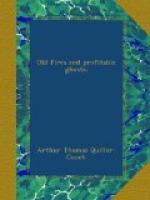“I fear you are unwell,” said I, offering a chair.
“I have reason to believe,” he answered, “that I am dying.” And then, as I uttered some expression of dismay and concern, he cut me short. “Oh, there will be no hurry about it! I mean, perhaps, no more than that all men carry about with them the seeds of their mortality—so why not I? But I came to talk of Julia Constantine, not of myself.”
“You may guess, Mr. Laquedem, that as her vicar, and having known her and her affliction all her life, I take something of a fatherly interest in the girl.”
“And having known her so long, do you not begin to observe some change in her, of late?”
“Why, to be sure,” said I, “she seems brighter.”
He nodded. “I have done that; or rather, love has done it.”
“Be careful, sir!” I cried. “Be careful of what you are going to tell me! If you have intended or wrought any harm to that girl, I tell you solemnly—”
But he held up a hand. “Ah, sir, be charitable! I tell you solemnly our love is not of that kind. We who have loved, and lost, and sought each other, and loved again through centuries, have outlearned that rougher passion. When she was a princess of Rome and I a Christian Jew led forth to the lions—”
I stood up, grasping the back of my chair and staring. At last I knew. This young man was stark mad.
He read my conviction at once. “I think, sir,” he went on, changing his tone, “the learned antiquary to whom, as you told me, you were sending your tracing of the plaque, has by this time replied with some information about it.”
Relieved at this change of subject, I answered quietly (while considering how best to get him out of the house), “My friend tells me that a similar design is found in Landulph Church, on the tomb of Theodore Paleologus, who died in 1636.”
“Precisely; of Theodore Paleologus, descendant of the Constantines.”
I began to grasp his insane meaning. “The race, so far as we know, is extinct,” said I.
“The race of the Constantines,” said he slowly and composedly, “is never extinct; and while it lasts, the soul of Julia Constantine will come to birth again and know the soul of the Jew, until—”
I waited.
“—Until their love lifts the curse, and the Jew can die.”
“This is mere madness,” said I, my tongue blurting it out at length.
“I expected you to say no less. Now look you, sir—in a few minutes I leave you, I walk home and spend an hour or two before bedtime in adding figures, balancing accounts; to-morrow I rise and go about my daily business cheerfully, methodically, always successfully. I am the long-headed man, making money because I know how to make it, respected by all, with no trace of madness in me. You, if you meet me to-morrow, shall recognise none. Just now you are forced to believe me mad. Believe




